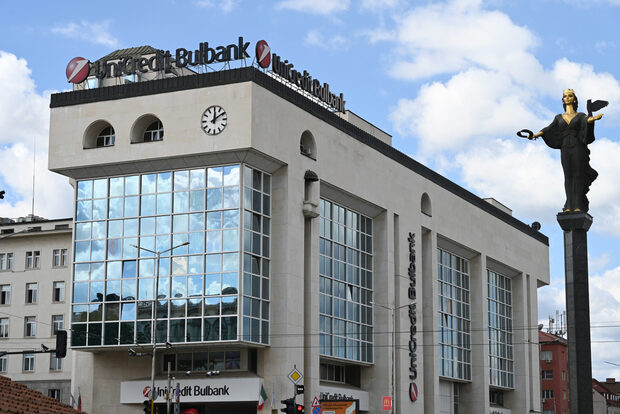The impending end of the expansion of the economic cycle is already openly perceived as a given. The global economy has been slowing down for months and some large players like Germany are already seeing a contraction. Forward-looking indicators signal a rising likelihood of a recession in the eurozone and even in the US. However, while international organizations like the IMF and the World Bank have revised downwards their economic forecasts, in no way do they foreshadow a collapse. The consensus among economic analysts is that economies across the globe can expect a gradual, but prolonged slowdown.
Currently, outlooks for Central and Eastern Europe remain mostly positive. International organizations and banks forecast a slight economic slowdown and no imminent recession. According to UniCredit, economic growth in the region will decrease by 1 percentage point to 2.8% in 2020. However, the bank's analysts are betting on a smaller decrease in countries like Bulgaria, Croatia and the Czech Republic, whereas countries like Romania and Hungary will feel a more significant contraction.
Risks are rising
In their latest revisions, two local lenders - UniCredit Bulbank and Raiffeisen bank, raised the forecasts for Bulgaria to 3.5% in 2019 but lowered their prediction for the next two years to 2.9% and 2.5%, respectively. In their autumn forecasts, the European Commission and the IMF also lowered the outlook for the years ahead. Meanwhile, the Bulgarian Ministry of Finance is betting on a continuous growth rate of 3.3% for 2020, 2021 and 2022.
The Bulgarian National Bank (BNB) has still not published its autumn forecast, but according to its summer Economic Review, there is no practical danger of a recession in 2020 as the chance of possible deviations from the central bank's base forecast is below 20%. However, the chances of growth turning out lower than expected are high. "External demand for Bulgarian goods and services could be lower than projected in the baseline scenario: possible buffers could include the lower economic growth of important trading partners for Bulgaria, the further deterioration of the Turkish economy, the United Kingdom leaving the EU without an agreement and the potential introduction of additional trade barriers by the US," said analysts at the BNB.
According to UniCredit, Central and Eastern Europe is already feeling the economic slowdown in Germany and the effects of lower exports will begin to trickle down to domestic demand by the end of 2019 and early 2020. As a result, for the first time since the last recession, next year economic growth will be below potential in the region. Bulgaria is still doing well, according to the bank.
In its vulnerability matrix, UniCredit ranks Bulgaria among the least risky economies in macroeconomic terms, while the main problems locally are the country's low standing in international business rankings such as the World Bank's Doing Business report and the World Economic Forum's Global Competitiveness Index. In both cases, Bulgaria is falling behind most countries in the EU because of pending reforms and other factors like bureaucracy, corruption and a cumbersome and unpredictable judicial system. At the end of the current economic cycle, Bulgaria has the third-lowest public debt in the EU at just over 20% of GDP, a decent fiscal reserve of 10 billion levs, a current account surplus of 5.5% of GDP and a relatively balanced budget.
Another plus maybe the expected recovery from the recession of neighbouring Turkey - one of the largest export destinations for Bulgaria. On the other hand, the downsides can come from all sorts of external shocks, which are capable of messing up any plans and turning any carefully predicted delay into a surprising crisis.
The new normal in Europe
According to the BNB deputy governor Kalin Hristov, the impending economic slowdown will be permanent, because problems in the eurozone are accumulating and not being solved. One such issue is the ageing of the European population, which is holding down potential economic growth. Secondly, Europe is falling behind in technological development and innovation compared to the US and China, which means no competitive advantages in terms of trade. Thirdly, government debt remains high across most member states and debt in the private sector is rising.
Hristov says that growth is currently being kept up by the ultra-expansionary monetary policy of the European Central Bank (ECB). However, ECB's monetary policy is becoming less effective, whereas fiscal policy is not an option because of the high levels of indebtedness in the public sector. Historically, structural changes have solved issues, but these policies are getting more and more unlikely as politicians put more value on re-election, Hristov said in a speech to participants at the seventh annual conference Banks and Business held in Sofia in November.
Interestingly, banks are predicting that real estate prices will continue to grow despite a moderate economic slowdown due to a combination of rising incomes and low-interest rates. Bankers are already worried about the rapid growth in mortgage lending at tight margins but the pace is far from the critical levels in 2007-2008 and so far the risks are considered manageable. At the same time, there is no willingness for more active regulatory intervention to curb the property boom. The BNB has introduced an additional countercyclical capital buffer but so far has not signalled rigid restrictions on the mortgage market.
According to Kalin Hristov, banking will be under more pressure because the current issues hindering economic growth in Europe are not cyclical but structural. The European Central Bank's policy will remain as it is, possibly with even lower negative interest rates. Monetary policy will likely turn into a weapon in trade disputes, which will affect Bulgaria as well. As a result, more risk will accumulate in the banking system and revenue will continue to decrease, which could force the banking regulator to implement higher capital requirements on financial institutions.
Yavor Petrov, CEO of iCard: Customers are ready for tech-based alternatives to traditional bank services
What was the main event in your business sector in Bulgaria in the last quarter?
The new Cross-border Payments Regulation that enters into force on December 15, 2019 will have an effect on the whole sector. For example, bank transfers in euro from Bulgaria (a non-euro area member state) to Germany (a euro-area member state) are now priced from 10 euro to over 24 euro, even for amounts below 50 euro. As of December 15, the fees for transactions in euro from Bulgaria to any EU member state are expected to decrease and cost as much as a domestic transfer, or approximately 1 euro. This regulatory change will intensify competition among market participants especially in the field of international transfers. iCard is a few steps ahead with its fixed fee of 1 euro per SEPA transfer and a lot of freemium services to its customers.
Another major shift in the sector from the last quarter is the further implementation of PSD 2, especially in the field of the so-called Strong Customers Authentication (SCA) measures. The latest example from September 2019 are the new rules for contactless transactions and the requirement for cardholders to validate their identity using PIN. This and other alterations caused by SCA and PSD 2 put a lot of pressure on all market players and create new challenges for the whole sector.
What do you see as the next major development in the field of your company's business in the forthcoming quarter or further?
I expect more and more national and international participants offering fintech products, including digital wallets, crowdfunding, lending and investments apps and platforms to enter the Bulgarian market. I assume we will also witness new partnerships between fintech companies and banks, telecommunication companies and other large service providers.
The market is young and comparatively small but there is no market leader yet. Moreover, recent surveys indicate that customers are ready for adopting fintech products and technology-based alternatives to traditional bank services. This makes it really attractive and drives new competitors into the battle for consumer attention.
Yavor Petrov became iCard's Chief Executive Officer in January 2018 and is a Member of the BoD since November 2015. He has over 20 years of professional experience in the field of software development, technologies, management, and background in building real-time payment systems and elaborate financial platforms. Under Mr Petrov's leadership, iCard AD continues advancing in digital payments, partnerships and integrations.
The impending end of the expansion of the economic cycle is already openly perceived as a given. The global economy has been slowing down for months and some large players like Germany are already seeing a contraction. Forward-looking indicators signal a rising likelihood of a recession in the eurozone and even in the US. However, while international organizations like the IMF and the World Bank have revised downwards their economic forecasts, in no way do they foreshadow a collapse. The consensus among economic analysts is that economies across the globe can expect a gradual, but prolonged slowdown.
Currently, outlooks for Central and Eastern Europe remain mostly positive. International organizations and banks forecast a slight economic slowdown and no imminent recession. According to UniCredit, economic growth in the region will decrease by 1 percentage point to 2.8% in 2020. However, the bank's analysts are betting on a smaller decrease in countries like Bulgaria, Croatia and the Czech Republic, whereas countries like Romania and Hungary will feel a more significant contraction.










